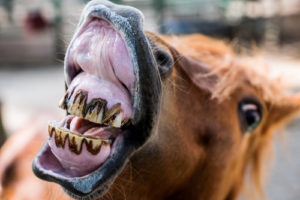The Rodeo and Teeth
This is one of our favorite times of the year: the annual Houston Livestock Show and Rodeo! From great concerts to exciting competitions to crazy food, the HLSR has it all. This fun blog will highlight facets of the rodeo that pertain to teeth.
Livestock Teeth
Animal teeth share some similarities with human teeth. Both horses and cows have a set of baby teeth that fall out when the permanent teeth come in. Cattle, sheep and goats have 20 baby teeth and 32 permanent teeth (just like humans!). These animals have the same types of teeth as humans: incisors, canines, premolars and molars. That is where the similarities end.
Horse Teeth
 Horses have variable numbers of teeth, ranging from 36 – 44 teeth. Male horses typically have more teeth than female horses because they sometimes have a residual canine. This canine was important for horses fighting in the wild. As horses have become more domesticated, these teeth are no longer necessary. If they are present in a male horse, a veterinarian will usually extract them.
Horses have variable numbers of teeth, ranging from 36 – 44 teeth. Male horses typically have more teeth than female horses because they sometimes have a residual canine. This canine was important for horses fighting in the wild. As horses have become more domesticated, these teeth are no longer necessary. If they are present in a male horse, a veterinarian will usually extract them.
The most interesting thing about horse teeth is that they continue to erupt (or grow into the mouth) throughout a horse’s lifetime. The horse’s normal chewing motion naturally grinds down the molars and keeps them at the proper height. In the wild, grazing and tearing vegetation wears enamel off the front teeth, keeping them from overgrowing and getting too long. However, horses kept in stalls do not have this advantage. In order to keep their teeth from getting too long, handlers “float” the teeth. “Floating” is the term used for filing the teeth down.
Cow Teeth
An interesting dental fact about cows is that they have no upper front teeth. Cows have lower incisors and an upper “dental pad”. This pad is an area of hard gum tissue that the lower front teeth grind against. Cows graze and use the lower incisors to slowly and methodically grind grass and hay between the lower teeth and the upper pad.
Llama and Alpaca Teeth
Llamas and alpacas are different from other ruminants by the presence of “fighting teeth”. They are unlike cows in that cows are completely toothless across the front upper dental arch. They are unlike horses in that horses have a full set of teeth across the front. Llamas and alpacas are mostly toothless on the upper dental pad, except for two sharp canine teeth. These teeth live up to their name. They can cause serious injury in a fight between llamas. In domesticated animals, veterinarians usually extract fighting teeth to prevent injury to other animals.
Rodeo Competitor’s Teeth
Rodeo competitors are tough. They often sustain serious injuries and “get back on the horse”. Injuries to the teeth are common. If you are a competitor or have a loved one competing, you should know these important to-do items for dental trauma.
- Prevent dental trauma – Wear an athletic mouthguard. A mouthguard made by your dentist for a custom fit provides the best protection. By covering the teeth and absorbing strong forces, an athletic mouthguard can prevent trauma to the teeth. It can also lessen the severity of the injury to teeth when trauma does occur. Call today to schedule an appointment with Dr. Ann or Dr. Lauren for a custom rodeo mouthguard. Preventing a problem is always more affordable that treating one.
- Be prepared for trauma – Know the proper steps to take when an injury to the teeth happens.
- Rule out any other serious injury first. Teeth take a backseat to concussions or other head and neck injuries.
- If the injury causes a tooth to break or fall out completely, find any tooth pieces. Bring these with you to your emergency dental visit. When a dentist has the broken piece or the missing tooth, it is possible to restore it back to the most natural appearance.
- Call your cosmetic dentist immediately and head to the office. In the absence of other serious injuries, teeth should be treated immediately. Addressing problems quickly often leads to a better long-term success of the treatment.
Your Teeth

We know that one of the most exciting aspects of the Houston Livestock Show and Rodeo is all of the crazy food. This year’s specials include a foot long Hot Cheetos corn dog, mango on a stick, bread pudding bites, funnel cake cheeseburger, and a mashed potato sundae. They also have classic fair favorites like turkey legs, corn dogs, sausage on a stick, and fried . . . well, fried everything!
In general, we are not too worried about all of the fried food. We will let your cardiologist lecture you about those. There are two main concerns with fair food.
- Food stuck in your teeth – All of the stringy meats, like turkey legs and barbecue, tend to catch easily between teeth. Food impaction increases your risk for cavities and gum disease. Chronic food impaction often leads to serious periodontal disease. There is a simple remedy for this one: bring floss. If you quickly floss any food debris from your teeth, you will have nothing to worry about!
- Sugar overload – So many of the fun fair foods are high in simple carbohydrates and packed with sugar. We do not want you to miss the fried cookie dough on a stick. We just do not want it to give you cavities. Here are two tips to reducing the risk of cavities from sugary fair food: 1) Eat fast to lower the amount of time the sugar touches your teeth. 2) Rinse your mouth with water afterward. Flush out any sugary debris, and neutralize the pH in your mouth.
Big Smiles
We want to see you enjoying the Houston Livestock Show and Rodeo. If Dr. Ann and Dr. Lauren take care of your teeth, tag us in a selfie at the rodeo. Let us see your smile!
